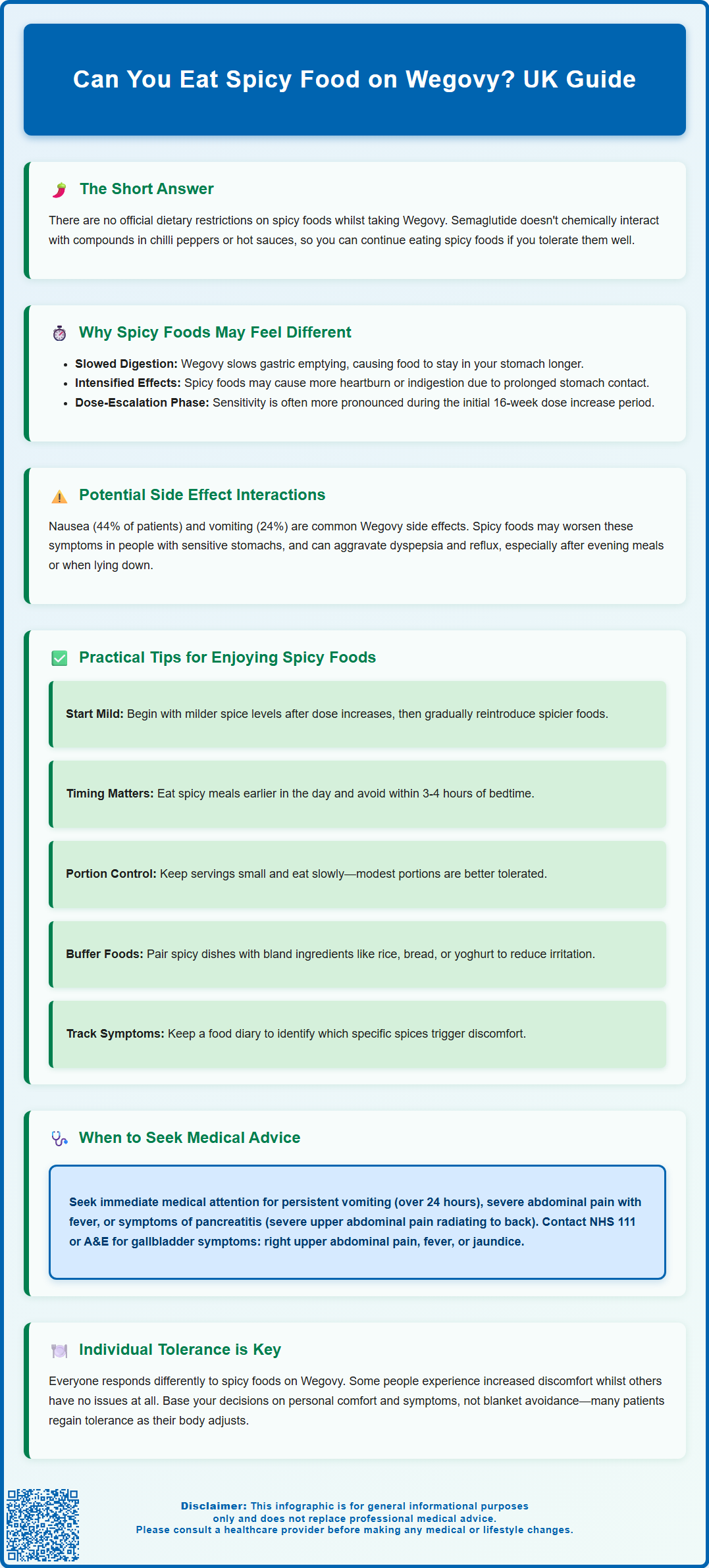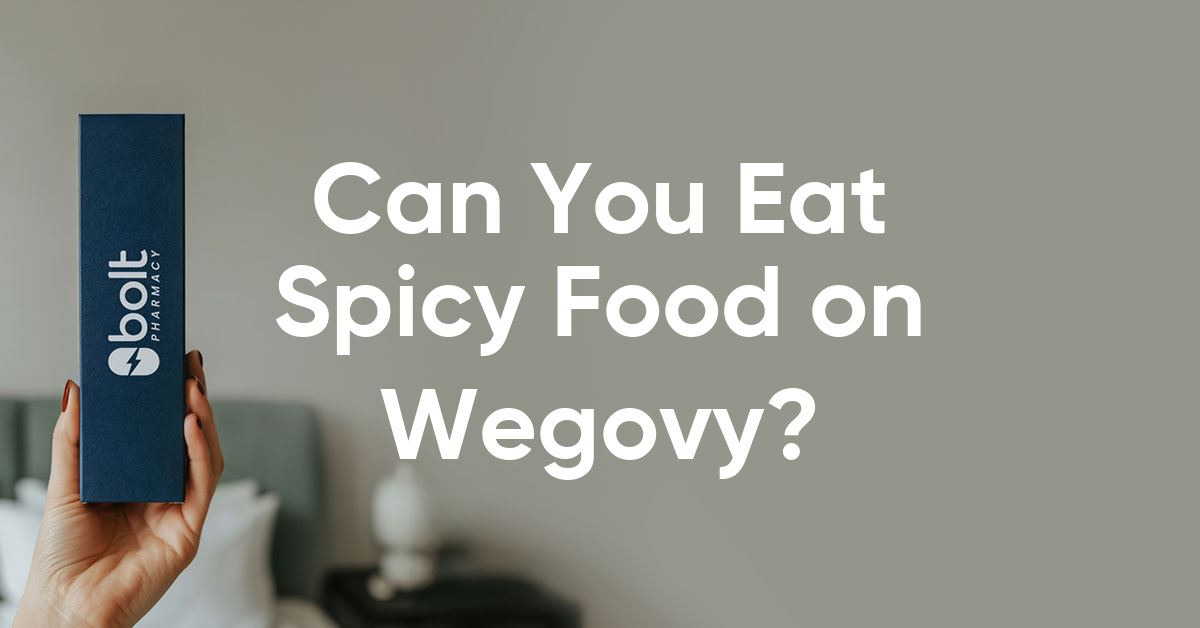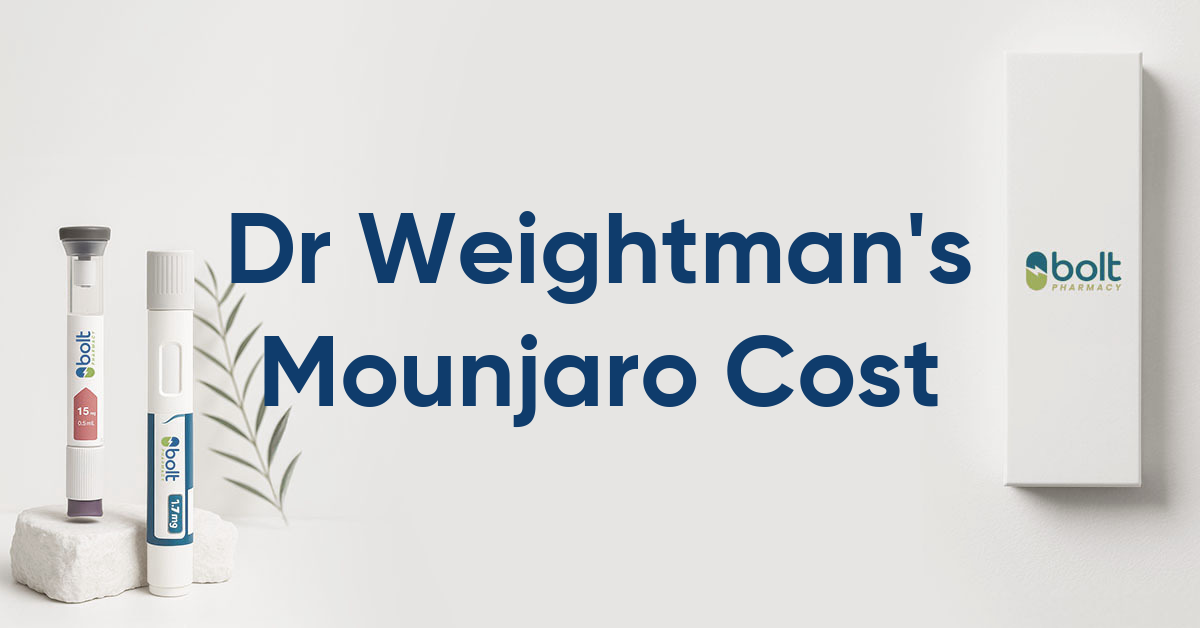Can you eat spicy food on Wegovy? Many patients prescribed this GLP-1 receptor agonist for weight management wonder whether their favourite curries, hot sauces, and spiced dishes remain on the menu. Wegovy (semaglutide 2.4 mg) slows gastric emptying and can cause gastrointestinal side effects such as nausea and indigestion, leading to understandable concerns about food choices. Whilst there are no specific dietary restrictions regarding spicy foods in the medication's Summary of Product Characteristics, individual tolerance may vary, particularly during dose escalation. Understanding how spicy foods interact with Wegovy's effects on digestion helps patients make informed, personalised dietary decisions throughout treatment.
Summary: You can eat spicy food on Wegovy, as there are no specific dietary restrictions, but individual tolerance may vary due to slowed gastric emptying and gastrointestinal side effects.
- Wegovy (semaglutide 2.4 mg) is a GLP-1 receptor agonist licensed by the MHRA for weight management in adults with obesity or overweight with weight-related comorbidities.
- The medication slows gastric emptying, which may prolong contact time with spicy foods and potentially intensify heartburn, indigestion, or nausea in some patients.
- Common gastrointestinal side effects include nausea (approximately 44% of patients) and vomiting (about 24%), which may be aggravated by spicy foods during dose escalation.
- Individual responses vary considerably; some patients tolerate spicy foods well throughout treatment, whilst others may need to reduce spice levels temporarily.
- Seek urgent medical attention for severe abdominal pain, persistent vomiting, or signs of gallbladder problems such as right upper abdominal pain, fever, or jaundice.
- Practical strategies include starting gradually with spice levels, eating smaller portions earlier in the day, and keeping a food diary to identify personal triggers.
Table of Contents
Understanding Wegovy and Dietary Considerations
Wegovy (semaglutide 2.4 mg) is a glucagon-like peptide-1 (GLP-1) receptor agonist licensed by the MHRA for weight management in adults with obesity or overweight with weight-related comorbidities. It works by mimicking the naturally occurring hormone GLP-1, which regulates appetite and food intake through several mechanisms. Semaglutide slows gastric emptying (most pronounced early in treatment), meaning food remains in the stomach for longer periods, which promotes satiety and reduces hunger signals. It also acts on areas of the brain involved in appetite regulation, helping patients feel fuller for longer after meals.
When initiating Wegovy, patients follow a dose-escalation schedule over 16 weeks (0.25, 0.5, 1.0, 1.7, 2.4 mg once weekly), with possible delays if not tolerated, to minimise gastrointestinal side effects. The medication is administered once weekly via subcutaneous injection, usually in the abdomen, thigh, or upper arm. NICE guidance (TA875) recommends Wegovy for adults with at least one weight-related comorbidity and BMI ≥35 kg/m² (with lower thresholds for some ethnic groups) or BMI 30-34.9 kg/m² in exceptional circumstances. Treatment should be delivered in specialist weight management services and is limited to a maximum of 2 years.
Whilst there are no specific dietary restrictions with Wegovy, understanding how the medication affects digestion is crucial for optimising treatment outcomes and minimising adverse effects. The slowed gastric emptying can influence how patients tolerate different foods, particularly those that are rich, fatty, or heavily spiced. Dietary considerations become particularly relevant during the initial titration phase when gastrointestinal side effects such as nausea, vomiting, and abdominal discomfort are most common. Patients are generally advised to adopt a balanced, nutrient-dense diet that supports gradual, sustainable weight loss whilst managing potential side effects. Understanding the interaction between food choices and medication effects empowers patients to make informed decisions about their diet throughout treatment.

Can You Eat Spicy Food Whilst Taking Wegovy?
There are no specific dietary restrictions in the Wegovy Summary of Product Characteristics (SmPC) regarding spicy foods. The medication does not chemically interact with capsaicin or other compounds found in chilli peppers, hot sauces, or spiced dishes. From a pharmacological perspective, semaglutide's mechanism of action does not preclude the consumption of any particular food group, including spicy foods. Patients are not required to eliminate spices, curry, hot peppers, or other piquant ingredients from their diet solely because they are taking this medication.
However, individual tolerance to spicy foods may change during Wegovy treatment due to the medication's effects on the gastrointestinal system. The slowed gastric emptying means that food—including spicy food—remains in the stomach longer than usual. For some patients, this prolonged contact time may intensify sensations of heartburn, indigestion, or gastric discomfort, particularly if they are already experiencing nausea or other gastrointestinal side effects from the medication.
Individual responses vary considerably between patients and across the titration period. Some individuals who previously enjoyed very hot foods may find them less appealing or more uncomfortable, especially during the dose-escalation phase. Conversely, others continue to enjoy spicy foods without any issues throughout their treatment journey.
The key principle is personalisation. If you have historically tolerated spicy foods well and continue to do so on Wegovy without exacerbating side effects, there is no medical reason to avoid them. The decision should be based on your individual response, symptom profile, and overall comfort rather than a blanket restriction.
How Spicy Foods May Affect Wegovy Side Effects
Understanding the potential interaction between spicy foods and common Wegovy side effects can help patients make informed dietary choices. According to the Wegovy SmPC, nausea and vomiting are among the most frequently reported adverse effects, with nausea occurring in approximately 44% and vomiting in about 24% of patients in clinical trials. These effects are typically mild to moderate and transient during the dose-escalation period. Spicy foods may potentially aggravate nausea in susceptible individuals, particularly when the stomach is already sensitive due to medication effects.
Dyspepsia (indigestion) is a common side effect of Wegovy, and spicy foods may contribute to reflux symptoms in some people. When combined with slowed gastric emptying, some patients may experience more pronounced burning sensations in the chest or throat, particularly after evening meals or when lying down shortly after eating.
Abdominal pain and discomfort are reported by some Wegovy users, and spicy foods may worsen these symptoms in certain individuals. The prolonged presence of irritating compounds in the stomach, combined with the medication's effects on gastric motility, can lead to increased cramping, bloating, or general abdominal discomfort in some cases.
It's important to note that responses vary considerably between individuals. Not all patients experience gastrointestinal side effects, and among those who do, the severity and duration differ. Some individuals find that their tolerance to spicy foods returns as their body adjusts to the medication. Monitoring your own response and adjusting your diet accordingly is the most practical approach.
Be aware that GLP-1 receptor agonists like Wegovy are associated with an increased risk of gallbladder problems (such as gallstones and inflammation). If you experience severe right upper abdominal pain, fever, or yellowing of the skin or eyes, seek urgent medical attention. Persistent vomiting or diarrhoea can also lead to dehydration and potentially acute kidney injury, requiring prompt medical review.
Practical Tips for Managing Spicy Foods on Wegovy
If you wish to continue enjoying spicy foods whilst taking Wegovy, several practical strategies can help minimise potential discomfort:
Start gradually: If you're in the early stages of treatment or have just increased your dose, consider temporarily reducing the spice level in your meals. You can gradually reintroduce spicier options as your body adjusts to the medication. This approach allows you to gauge your tolerance without triggering significant side effects.
Timing matters: Consume spicy foods earlier in the day rather than late in the evening. This gives your digestive system more time to process the meal before lying down, reducing the risk of reflux symptoms. Avoid eating spicy meals within 3–4 hours of bedtime and avoid lying down soon after eating.
Portion control: Smaller, more frequent meals are generally better tolerated on Wegovy than large portions, as advised in the Patient Information Leaflet. Eat slowly, chew thoroughly, and stop at the first sign of fullness. If you're including spicy foods, keep portions modest to avoid overwhelming your already-slowed digestive system. This approach aligns with general dietary advice for weight management and can help prevent excessive fullness and discomfort.
Pair wisely: Combine spicy foods with bland, soothing ingredients that can buffer their effects. Rice, bread, yoghurt, or mild vegetables can help moderate the impact of spicy components. Avoid combining very spicy foods with high-fat items, as fatty foods also slow digestion and may compound gastrointestinal symptoms, especially during the titration phase.
Stay hydrated: Adequate fluid intake supports digestion and can help manage any gastric irritation. However, avoid drinking large volumes of liquid with meals, as this can increase feelings of fullness and nausea. Sip water throughout the day instead.
Keep a food diary: Tracking what you eat and any symptoms you experience can help identify specific triggers. You may find that certain types of spice (e.g., black pepper versus chilli) or particular dishes cause more problems than others, allowing you to make targeted adjustments rather than eliminating all spicy foods.
When to Seek Medical Advice About Diet and Wegovy
Whilst dietary adjustments are often manageable independently, certain situations warrant professional medical guidance. Contact your GP or prescribing clinician if you experience persistent or severe gastrointestinal symptoms that interfere with your ability to maintain adequate nutrition or hydration. Persistent vomiting (unable to keep down food or fluids for more than 24 hours) requires prompt medical attention, as it can lead to dehydration and electrolyte imbalances, potentially causing acute kidney injury.
Severe abdominal pain, particularly if it is constant, worsening, or accompanied by fever, should be evaluated urgently. Whilst rare, semaglutide has been associated with acute pancreatitis in some cases. Symptoms include severe upper abdominal pain that may radiate to the back, nausea, and vomiting. If you suspect pancreatitis, seek immediate medical attention and discontinue Wegovy until assessed by a healthcare professional.
Be alert to gallbladder problems, which can occur with GLP-1 receptor agonists. Contact NHS 111 or attend A&E if you develop right upper abdominal pain, fever, or jaundice (yellowing of the skin or eyes), as these may indicate gallstones or gallbladder inflammation.
Significant changes in bowel habits that persist or worsen beyond the dose-escalation period or that impact daily life should be discussed with your doctor. Whilst some gastrointestinal changes are expected with GLP-1 receptor agonists, ongoing diarrhoea, constipation, or other concerning symptoms may require investigation or management strategies.
If you find that dietary restrictions are becoming overly limiting or are affecting your quality of life, discuss this with your healthcare team. They can provide personalised advice, suggest alternative management strategies, or consider whether Wegovy remains the most appropriate treatment option for you. Registered dietitians with experience in weight management can provide valuable support in developing an eating plan that balances symptom management with nutritional adequacy and enjoyment.
Note that Wegovy is not recommended in severe gastrointestinal disease, including severe gastroparesis. If you have pre-existing gastrointestinal conditions, ensure your prescriber is aware, as these may influence how you tolerate both the medication and certain foods, including spicy options.
If you have diabetes and take insulin or sulfonylureas, be aware that reduced food intake may increase your risk of hypoglycaemia; discuss medication adjustments with your healthcare team.
Report any suspected side effects to the MHRA Yellow Card Scheme (yellowcard.mhra.gov.uk).
Scientific References
- Wegovy 0.25 mg, FlexTouch solution for injection in pre-filled pen - Summary of Product Characteristics (SmPC).
- Semaglutide for managing overweight and obesity. Technology appraisal guidance [TA875].
- Once-Weekly Semaglutide in Adults with Overweight or Obesity.
- Report a problem with a medicine or medical device - Yellow Card Scheme.
Frequently Asked Questions
Does Wegovy interact with spicy foods?
Wegovy does not chemically interact with capsaicin or other compounds in spicy foods. However, the medication's effect of slowing gastric emptying may prolong contact time with spicy ingredients, potentially intensifying heartburn or indigestion in some individuals.
Will spicy food make Wegovy side effects worse?
Spicy foods may aggravate common Wegovy side effects such as nausea, dyspepsia, and abdominal discomfort in some patients, particularly during dose escalation. Individual responses vary, and many people continue to tolerate spicy foods well throughout treatment.
When should I avoid spicy food on Wegovy?
Consider temporarily reducing spice levels if you experience significant nausea, vomiting, or gastric discomfort, especially during the initial titration phase. You can gradually reintroduce spicy foods as your body adjusts to the medication and symptoms improve.
The health-related content published on this site is based on credible scientific sources and is periodically reviewed to ensure accuracy and relevance. Although we aim to reflect the most current medical knowledge, the material is meant for general education and awareness only.
The information on this site is not a substitute for professional medical advice. For any health concerns, please speak with a qualified medical professional. By using this information, you acknowledge responsibility for any decisions made and understand we are not liable for any consequences that may result.
Heading 1
Heading 2
Heading 3
Heading 4
Heading 5
Heading 6
Lorem ipsum dolor sit amet, consectetur adipiscing elit, sed do eiusmod tempor incididunt ut labore et dolore magna aliqua. Ut enim ad minim veniam, quis nostrud exercitation ullamco laboris nisi ut aliquip ex ea commodo consequat. Duis aute irure dolor in reprehenderit in voluptate velit esse cillum dolore eu fugiat nulla pariatur.
Block quote
Ordered list
- Item 1
- Item 2
- Item 3
Unordered list
- Item A
- Item B
- Item C
Bold text
Emphasis
Superscript
Subscript










